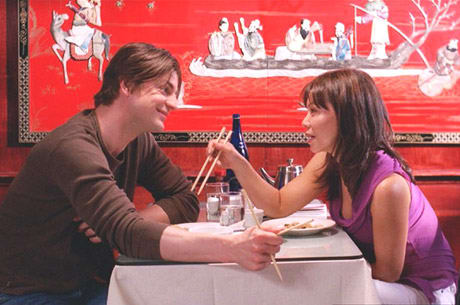The biggest problem with reviewing a movie like Falling for Grace, which, for all intents and purposes, is a piece of crap, is the realization that it most likely was quite the feat for the filmmaker, whose observed psychological limitations are profound. So, do you obey the social customs you adhere to on a daily basis and toss out the equivalent of, "Why, no, I've never seen Dancing with the Stars, but I hear a lot of people really enjoy it," which is patronizing, or do you point out that the writer/director likely would have made an excellent doctor or stock broker? And it's true, Fay Ann Lee, the writer, director and star of this independent rom-com about Asian-American stereotypes, seems bright enough on a systemic, competency-based level, and is fairly charming once you look past the shallowness of her character in the film, but she's not a writer or director. Casting herself in the lead role as a successful corporate cog named Grace Tang, Lee gives her character anxieties about growing up in Chinatown, concerned with fitting into the elite New York society. Of course, since this is a romantic comedy, she's mistaken for someone with a more dignified upbringing (because white people think Asians all look the same), winning the notice of Andrew (Gale Harold), a tedious, privileged lawyer. This leaves the moral centre of the film dependent on her decision to go along with the lie while Margaret Cho makes wisecracks. What is amusing about this supposed subtext involving cultural embarrassment of self is that she doesn't fess up, reluctantly accepting her role without pride, only to find purpose when her wooden love interest takes it upon himself to accept her for who she is, even if she'd rather be a vacuous socialite. There isn't a great deal of advancement, and the rest of the film features overly forced and highly unlikely racial slights, such as a CEO referring to Grace as an "oriental" during a business meeting, along with flat, uninspired writing (the male characters toss out zingers like "Smokin!," a witticism made famous by Jim Carrey back in 1994). On the unintentionally amusing front are the flea market paintings and dollar store knickknacks strewn throughout the homes of millionaires, making for minor amusement while we wait for our Cinderella protagonist to turn into a pumpkin, or a rat. A commentary track is included with the DVD, where we can hear about budgetary constraints and intent.
(Gaiam)Falling For Grace
Fay Ann Lee

BY Robert BellPublished Mar 5, 2010



